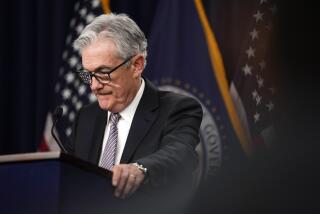Europe Central Bank Raises Interest Rate
- Share via
The Federal Reserve might be on hold, but not the European Central Bank.
The ECB on Thursday raised its key short-term interest rate by a quarter of a percentage point, the sixth increase in 10 months, as the central bank took aim at what it sees as a growing inflation threat.
The ECB, which controls rates for the 11 nations in the euro currency bloc, lifted its benchmark refinancing rate to 4.50% from 4.25%.
“We have to make sure inflation stays under control,” Bank of France Governor Jean-Claude Trichet said, echoing comments by ECB Economist Otmar Issing.
The euro region’s inflation rate, at an annualized 2.4% in July, overshot the ECB’s 2% ceiling for a second straight month.
The cost of imported goods, particularly dollar-denominated raw materials, has risen as the euro currency has slumped 11.5% against the dollar this year, extending the currency’s fall since its introduction in January 1999, to almost 25%.
Oil prices have tripled in the last 18 months, further fanning inflation. “Prices are rising on all fronts,” said Anja Hochberg, an economist at Landesbank Hessen-Thueringen in Frankfurt. “Fast action is needed.”
By contrast, the U.S. Fed has held its key short-term rate steady at 6.5% this summer, apparently content that signs of a slowing U.S. economy will dampen domestic inflation pressures.
The ECB has rejected suggestions that rates are at a level that risks throttling economic growth. “Borrowing costs are no barrier to growth,” Bundesbank President Ernst Welteke said this week.
Nor have rates had much of a depressive effect on key European stock markets. Indeed, European markets closed mostly higher Thursday after the rate increase. Measured in euro terms, many European markets have performed better than major U.S. stock indexes have done in dollar terms.
But the persistent weakness of the euro currency against the dollar has severely hurt returns for U.S. investors in European stocks, by slashing the value of their holdings when translated into dollars.
The main French CAC-40 stock index, for example, is up 11.2% in euro terms this year--but down 1.6% in dollar terms.
There doesn’t appear to be much help on the way for U.S. investors: On Thursday, the euro fell again, ending at a record low of 88.7 U.S. cents in New York, down from 89.2 cents on Wednesday--despite the ECB rate boost, which in theory should make the currency more appealing.
(BEGIN TEXT OF INFOBOX / INFOGRAPHIC)
Euro’s Slide Eats Stock Gains
Many European stock markets are faring relatively well this year, despite the European Central Bank’s ongoing campaign to raise interest rates. But the euro currency’s plunge versus the dollar has eroded European market returns for U.S. investors. Price changes for key markets as measured in euros and in dollars:
*--*
August change in: YTD change in: Market (index) Euros Dollars Euros Dollars Italy (MIB30) +3.7% +0.9% +11.6% -1.3% Spain (IBEX) +3.2 +0.4 -6.5 -17.3 Netherlands (AEX) +2.8 nil +2.7 -9.1 France (CAC) +1.4 -1.3 +11.2 -1.6 Germany (DAX) +1.0 -1.7 +3.7 -8.2 Ireland (overall) +5.5 +2.7 +7.7 -4.7 U.S. (S&P; 500) +6.1 +3.3
*--*
Source: Bloomberg News
More to Read
Sign up for Essential California
The most important California stories and recommendations in your inbox every morning.
You may occasionally receive promotional content from the Los Angeles Times.













